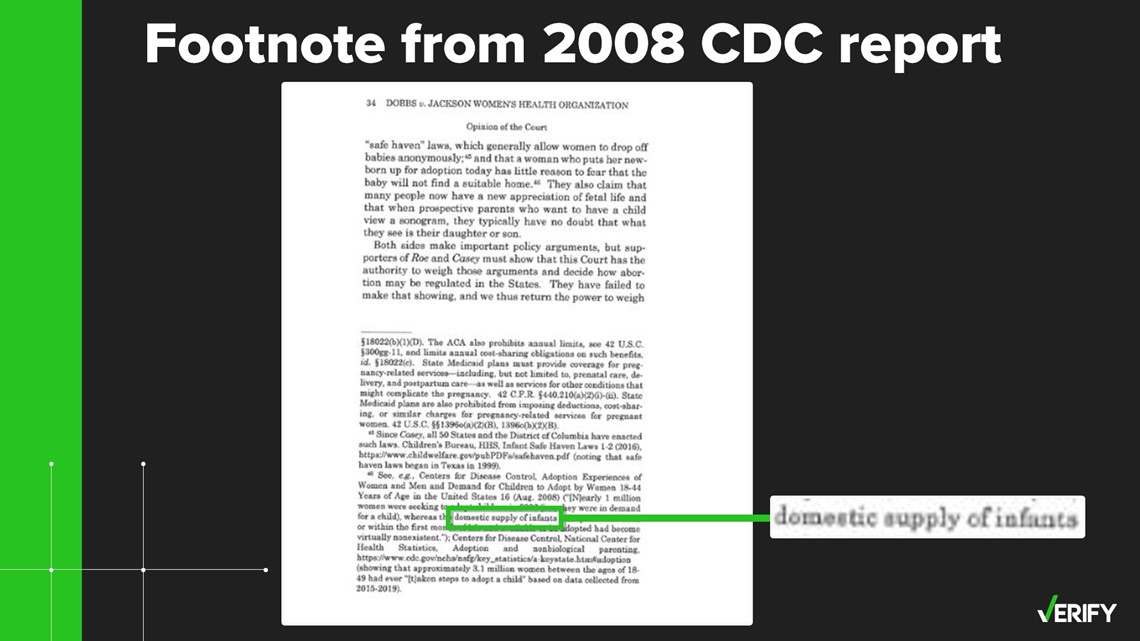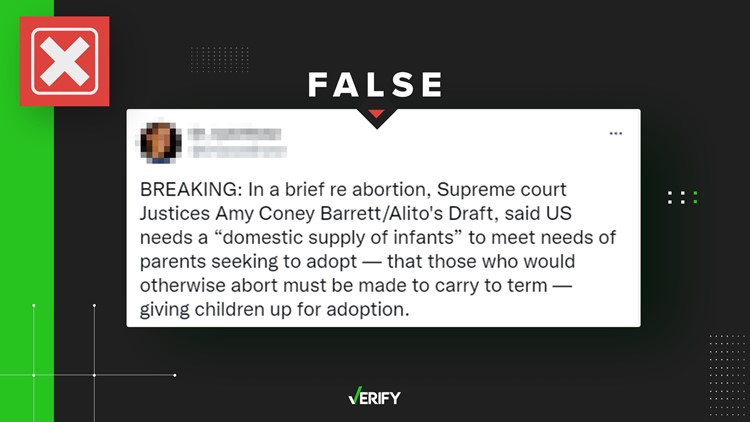Update June 24, 2022: The Supreme Court overturned Roe v. Wade on June 24, ruling in favor of Mississippi's anti-abortion law in Dobbs v. Jackson Women's Health Organization. This story references a line referring to a “domestic supply of infants” that appeared in both the draft opinion and final ruling. This story has been updated to reflect the official Supreme Court decision.
In early May, Politico published a leaked copy of a Supreme Court draft majority opinion that predicted the court would overturn Roe v. Wade, which made abortion legal nationwide.
On June 24, the Supreme Court did overturn the decades-old abortion decision, paving the way for abortion bans to go into effect in roughly half of U.S. states.
When the draft decision was leaked, some Twitter users claimed that Supreme Court Justices Samuel Alito and Amy Coney Barrett said in the draft opinion that the United States needs a “domestic supply of infants” for adoption as justification for overturning Roe v. Wade.
THE QUESTION
Did Supreme Court justices say the U.S. needs a "domestic supply of infants" for adoption in the draft opinion?
THE SOURCES
THE ANSWER
No, Supreme Court justices didn’t say the U.S. needs a “domestic supply of infants” for adoption in the draft opinion.
WHAT WE FOUND
Justices Samuel Alito and Amy Coney Barrett did not write the line in the draft opinion that refers to a “domestic supply of infants” in the United States. This language comes from a 2008 Centers for Disease Control and Prevention (CDC) report on adoption that is included as a footnote in the draft opinion.
The footnote was also included in the final decision released by the Supreme Court on June 24.
The CDC report, titled “Adoption Experiences of Women and Men and Demand for Children to Adopt by Women 18-44 Years of Age in the United States,” used data from the 2002 National Survey of Family Growth, a press release says.
While outlining arguments from those who are opposed to abortion, Alito wrote on Page 34 of the draft opinion that “a woman who puts her newborn up for adoption today has little reason to fear that the baby will not find a suitable home.” The footnote also appeared on Page 34 of the final decision.
That line had a footnote that quotes page 16 of the 2008 CDC report: "Nearly 1 million women were seeking to adopt children in 2002 (i.e., they were in demand of a child), whereas the domestic supply of infants relinquished at birth or within the first month of life and available to be adopted had become virtually nonexistent."


The phrase “domestic supply of infants and children” is also used in the CDC report’s introduction, as experts explain that the number of adoptions are “governed by the number of children available for adoption (supply) and the number of individuals and couples seeking children to adopt (demand).” Societal changes – including unmarried, pregnant people more frequently keeping and raising their babies – led to a decrease in the number of children in the U.S. placed for adoption, according to the report.
“Because of the decrease in the domestic supply of infants and children available for adoption, more affluent women and couples have increasingly sought to adopt children from other countries,” the report says.
The draft and final opinion in effect stated the U.S. Constitution doesn’t include the right to abortion, meaning that states should be allowed to regulate, ban or allow the procedure.
“It is time to heed the Constitution and return the issue of abortion to the people’s elected representatives,” the draft opinion said in part. The quote was also in the final opinion.
So we can VERIFY that Alito did not say the U.S. needs a “domestic supply of infants” for adoption in the draft opinion. The footnote references a 2008 CDC report that contained that language.
The Associated Press contributed to this report.













